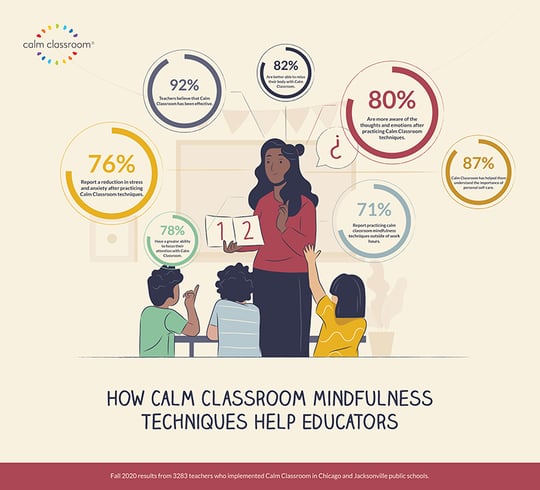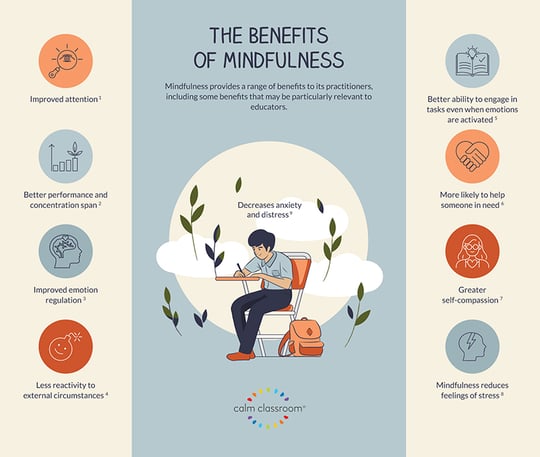Why Mindfulness Should Be a Priority in ESSA Grant Spending
Thanks to the American Rescue Plan package, many school districts are receiving an influx of ESSA grant funding. Educators now have an opportunity to fund substantial mental health and social-emotional learning (SEL) initiatives, along with many other programs that benefit their school communities.
Calm Classroom is a school mindfulness program that meets the criteria for eligibility for ESSA grant spending. Our program also meets criteria for many other grants and categorical funds that may expire on an annual basis. If your school or district is looking for a way to better support students' and teachers' mental and emotional wellbeing, reach out to us today.
Mindfulness programs are an obvious choice for ESSA grant spending, as they can substantially impact the school community’s success in other priority areas, like academics and overall student well-being. School districts should strongly consider including a mindfulness program and other mental health efforts in their spending priorities.
Why Mental Health Should Be a Priority for Schools in 2021-24

Research shows that as many as 48% of American youth may experience multiple forms of childhood trauma, which has serious mental health implications (Saunders & Adams 2014). Depending on definitions, anywhere from 38 to 70% of youth have witnessed serious community violence, 9-19% have experienced physical abuse by a caregiver or physical assault, and roughly 1 in 10 have witnessed serious violence between caregivers. Many children are also negatively impacted by everyday issues in their family lives.
And that’s just the pre-COVID status quo: many students experienced additional stressors like increased social isolation, family stress, and breakdowns in routine during the pandemic. Children became more likely to feel inattentive, uncertain, fearful, anxious, and isolated (Singh et al. 2020). Many also experienced physical stress symptoms like disturbed sleep and poor appetite.
It’s clear that now more than ever, students are struggling with stress and mental health. We know that excessive stress negatively affects attention, concentration, and overall academic success (Shankar & Park 2016). If schools wish to help their students succeed in their academic pursuits (and every other area of their lives!), mental health programs need to be a part of the plan.
The Most Effective Way to Improve Mental Health in Schools
A mindfulness program is one of the best investments you can make in your school community’s mental health and ability to tackle other educational challenges. Research has repeatedly shown that mindfulness education can reduce the adverse effects of stress, increase engagement, and improve academic performance, among other benefits.
Mindfulness programs also tend to be relatively easy to implement. They are often inexpensive and require minimal teacher training time. That means you can make an enormous impact on your students’ mental health and overall well-being with a tiny portion of your school district’s ESSA grant funding.
The Benefits of Mindfulness
Emotional Regulation and Executive Function
Mindfulness programs have been shown to help children and adolescents develop emotion regulation and executive function, especially in elementary school (Tang et al. 2012). Teachers implementing mindfulness programs have reported significant changes in classroom behavior, including greater attention, participation, self-control, and care and respect for other students (Black et al. 2014). Children who demonstrate the least initial self-regulatory abilities may benefit the most from mindfulness programs (Flook et al. 2010).
Student Mental Health
Countless studies have shown that mindfulness has significant mental health and stress-reduction benefits for both adults and children, including in school-based settings (Calvete 2014). Research has also shown that mindfulness reduces stress levels among school children from lower socioeconomic backgrounds and urban settings (Costello and Lawler 2014, Sibinga et al. 2016). Young people who practice mindfulness have reported “greater calm, balance, and control.”
School Community Well-being
Mindfulness programs aren’t just for students: they also reduce stress for educators (Kerr et al. 2017) and allow teachers and parents to help children more effectively. When adults practice mindfulness, they tend to become more emotionally aware of the children in their lives and better able to stay calm in stressful situations. One study found that mindfulness training for teachers can positively affect the behavior of their preschool students (Singh et al. 2013). Similarly, mindfulness for parents is associated with positive parent-youth relationships and lower youth aggression (Coatsworth, et al. 2018).
Academic Performance
Multiple studies have shown that elementary & middle school students’ academic performance improves after they are exposed to mindfulness-based intervention programs (Benson et al. 2000, Bakosh et al. 2015). Mindfulness can even improve test scores, most likely by reducing the impact of anxious thoughts that would otherwise disrupt cognitive control (Bellinger et al. 2015).
Your school community will thank you for investing in mindfulness!
Need help on how to best utilize your ESSA funds? Learn more about our K-12 Mindfulness teacher training and school programs by contacting us today.
______________
References
Bakosh, Laura et al. “Maximizing Mindful Learning: An Innovative Mindful Awareness Intervention Improves Elementary School Students’ Quarterly Grades.” Mindfulness (2015). doi: 10.1007/s12671-015-0387-6.
Bellinger, David B et al. “Mindfulness, anxiety, and high-stakes mathematics performance in the laboratory and classroom.” Consciousness and cognition vol. 37 (2015): 123-32. doi: 10.1016/j.concog.2015.09.001
Benson, Herbert et al. “Academic Performance Among Middle School Students After Exposure to a Relaxation Response Curriculum.” Journal of Research and Development in Education vol 33,1 (2000).
Black, David S, and Randima Fernando. “Mindfulness Training and Classroom Behavior Among Lower-Income and Ethnic Minority Elementary School Children.” Journal of child and family studies vol. 23,7 (2014): 1242-1246. doi:10.1007/s10826-013-9784-4
Calvete, Esther et al. “Adaptation of the Mindful Attention Awareness Scale-Adolescents (MAAS-A) to assess the mindfulness trait in Spanish adolescents.” Behavioral Psychology/Psicologia Conductual 22 (2014): 275-289.
Coatsworth, J. D. et al. “Changes in mindful parenting: Associations with changes in parenting, parent–youth relationship quality, and youth behavior.” Journal of the Society for Social Work and Research 9,4 (2018): 511–529. doi: 10.1086/701148
Costello, Elizabeth, and Margaret Lawler. “An Exploratory Study of the Effects of Mindfulness on Perceived Levels of Stress among School-Children from Lower Socioeconomic Backgrounds.” International Journal of Emotional Education 6,2 (2014): 21-39.
Flook, Lisa et al. “Effects of Mindful Awareness Practices on Executive Functions in Elementary School Children.” Journal of Applied School Psychology 26 (2010): 70 - 95.
Kerr, Sandra L. et al. “Is mindfulness training useful for pre-service teachers? An exploratory investigation.” Teaching Education 28,4 (2017): 349-359. doi: 10.1080/10476210.2017.1296831
Saunders, Benjamin E, and Zachary W Adams. “Epidemiology of traumatic experiences in childhood.” Child and adolescent psychiatric clinics of North America vol. 23,2 (2014): 167-84, vii. doi:10.1016/j.chc.2013.12.003
Shankar, Nilani L, & Crystal L Park. “Effects of stress on students' physical and mental health and academic success.” International Journal of School & Educational Psychology vol 4,1 (2016): 5-9. doi: 10.1080/21683603.2016.1130532
Sibinga, Erica M.S. et al. “School-Based Mindfulness Instruction: An RCT.” Pediatrics 137,1 (2016). doi: 10.1542/peds.2015-2532
Singh, Nirbhay N. et al. “Mindfulness Training for Teachers Changes the Behavior of Their Preschool Students.” Research in Human Development 10,3 (2013): 211-233. doi: 10.1080/15427609.2013.818484
Singh, Shweta et al. “Impact of COVID-19 and lockdown on mental health of children and adolescents: A narrative review with recommendations.” Psychiatry research vol. 293 (2020): 113429. doi:10.1016/j.psychres.2020.113429
Tang, Yi-Yuan et al. “Improving Executive Function and its Neurobiological Mechanisms through a Mindfulness-Based Intervention: Advances within the Field of Developmental Neuroscience.” Child development perspectives vol. 6,4 (2012): 361-366. doi:10.1111/j.1750-8606.2012.00250.x
Zenner, Charlotte et al. “Mindfulness-based interventions in schools—a systematic review and meta-analysis.” Front. Psychol. 5 (2014): 603. doi: 10.3389/fpsyg.2014.00603






SIGN UP FOR OUR NEWSLETTER